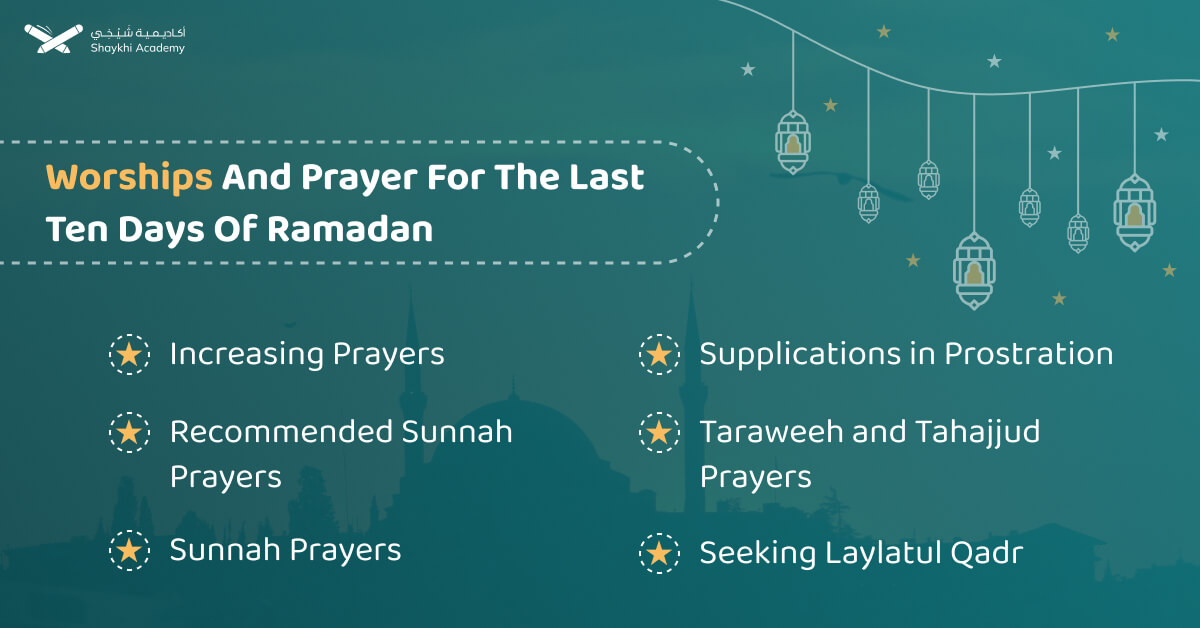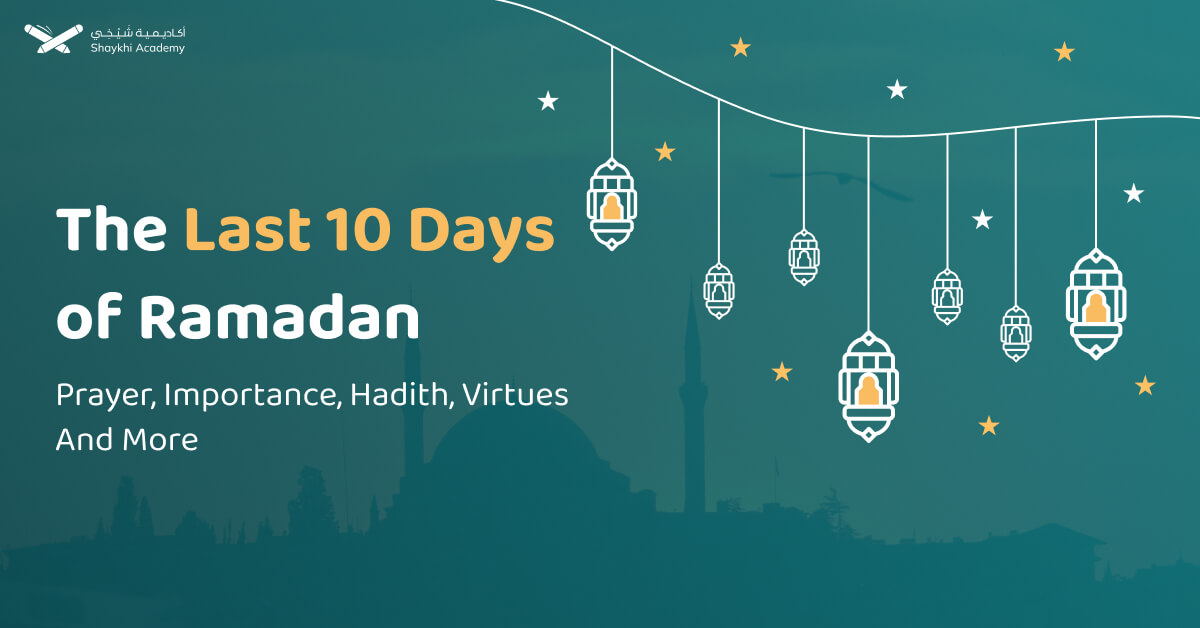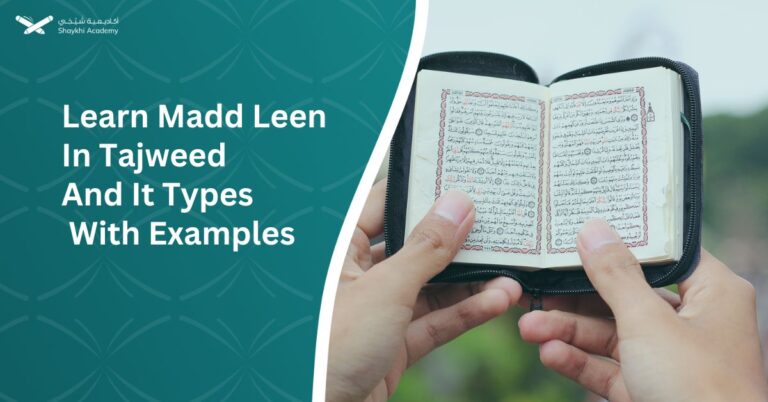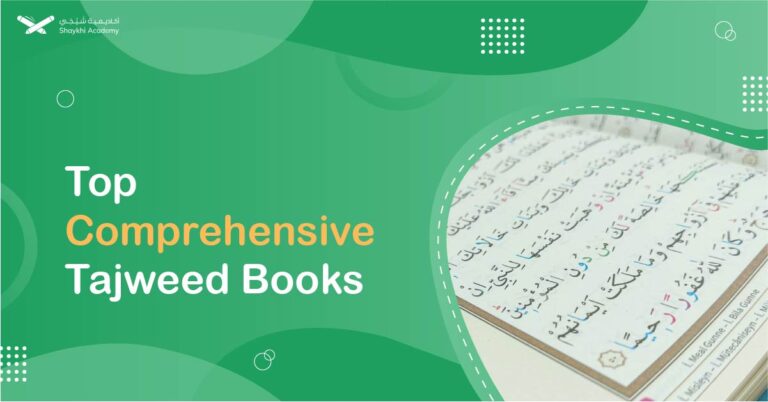The last ten days of Ramadan hold immense significance for Muslims worldwide, marked by intensified worship, supplication, and seeking of Laylatul Qadr (the Night of Decree). These days are considered the most sacred and blessed period for spiritual reflection and devotion. Muslims eagerly seek Laylatul Qadr during this time, as it holds immense value, being better than a thousand months according to the Quran.
The last ten days of Ramadan and nights are extremely important because they are a time for spiritual purification and cleaning while Allah bestows immeasurable kindness in His creation. Before the month of Ramadan ends, take advantage of these unique days to reap the many benefits of the fast and seek salvation.
What Are The Last Ten Days Of Ramadan?
The last ten days of Ramadan are considered the most sacred and blessed period for worship and righteous deeds, beginning from the night of the 21st of Ramadan until the night of the 30th, if the month is complete. Muslims eagerly seek Laylatul Qadr (the Night of Decree) during these nights, as it holds immense significance, with Allah stating in the Quran that it is better than a thousand months.
Prophet Muhammad (peace be upon him) used to intensify his worship during these days, spending the entire night in devotion and encouraging his family to do the same.
It is crucial for parents to inspire their children to follow the Prophet’s example by prioritizing acts of worship and obedience to Allah during these blessed nights.
The last ten days hold special importance, with the Prophet and his companions exhibiting heightened dedication to worship and remembrance during this time. It is incumbent upon believers to emulate their example, seeking Allah’s favor and maximizing their efforts in devotion and obedience during these blessed days.
What are the last 10 days of Ramadan called?
The last 10 days of Ramadan are called Ashra, or Nijaat, which means “salvation.” Furthermore, the final ten days of Ramadan are regarded by Islamic theology as being the most important of the whole month and as being crucial to our efforts to please Allah (SWT).
When Does The Last Ten Days Of Ramadan Start?
The last ten nights of Ramadan, known for their significance in worship and righteous deeds, begin from the night of the 21st of Ramadan until the night of the 30th of Ramadan, if the month is complete. Muslims seek Laylat al-Qadr (the Night of Decree) during these nights, as it holds immense value. Despite differences among scholars regarding its exact date, Laylat al-Qadr is believed to fall within the odd nights of the last ten days of Ramadan, particularly on the 21st, 23rd, 25th, 27th, and 29th nights.
The last ten nights of Ramadan in 2024 start on the evening of March 31st and continue until the night of April 9th, if the month completes its full duration. These nights are highly esteemed for worship and righteous deeds, with Muslims seeking Laylat al-Qadr (the Night of Decree) during this period.
Worships And Prayer For The Last Ten Days Of Ramadan
During the last ten days of Ramadan, Muslims are encouraged to intensify their worship and prayer activities. This includes increasing the performance of obligatory prayers, observing Sunnah prayers before and after them, and engaging in supplications, especially during prostration and between the Adhan and Iqamah. Muslims should prioritize Taraweeh and Tahajjud prayers, striving to recite more Quran and prolonging their standing before Allah. Additionally, they should seek Laylatul Qadr, the Night of Decree, through increased supplications and seeking forgiveness, aiming to maximize their rewards during these blessed nights.
1. Increasing Prayers:
During the last ten days of Ramadan, Muslims should prioritize increasing their prayers, ensuring the performance of the obligatory prayers and striving to pray them on time.
2. Sunnah Prayers:
It is recommended to observe the Sunnah prayers before and after the obligatory ones, as they contribute to building mansions in Paradise according to the teachings of Prophet Muhammad (peace be upon him).
3. Recommended Sunnah Prayers:
Muslims are encouraged to perform specific Sunnah prayers, including those before and after each obligatory prayer, such as the two Rak’ahs before Fajr and the two or four Rak’ahs before and after Dhuhr, Asr, Maghrib, and Isha.
4. Supplications in Prostration:
Frequent supplications during prostration in every prayer are highly recommended, as the Prophet emphasized the significance of this act, stating that a person is closest to Allah while in prostration.
5. Taraweeh and Tahajjud Prayers:
Muslims should exert effort in performing Taraweeh prayers during the last ten nights of Ramadan, increasing the recitation of the Quran and prolonging the standing before Allah. Additionally, allocating a portion of the night for Tahajjud prayers is recommended.
6. Intensified Supplications:
During these blessed nights, Muslims should intensify their supplications, seeking Allah’s forgiveness and guidance. It is recommended to supplicate between the Adhan and Iqamah, as well as after completing the obligatory prayers.
7. Qunoot Supplication:
Offering Qunoot supplication during the obligatory prayers is encouraged, as it is considered a noble act that seeks Allah’s mercy and blessings.
8. Seeking Laylatul Qadr:
One of the most significant acts during the last ten nights is seeking Laylatul Qadr, the Night of Decree, which is better than a thousand months. Muslims should earnestly seek forgiveness and engage in supplication during this auspicious night.

Importance And Benefits Of the Last 10 Nights Of Ramadan
During the last ten nights of Ramadan, Muslims seek Laylatul Qadr, a night of immense blessings when the Qur’an was revealed. These nights are marked by intensified worship, including optional prayers and supplications, along with observance of I’tikaf, the dedication to spiritual reflection and detachment from worldly affairs.
Giving sadaqah during this time multiplies blessings, and reading about the Prophet’s life inspires greater devotion. Completion of multiple readings of the Qur’an further deepens spiritual connection and earns abundant rewards from Allah.
1. Search for Laylatul Qadr:
Laylatul Qadr, also known as the Night of Decree or Power, holds immense significance as it marks the night when the Prophet Muhammad (peace be upon him) received the revelation of the Qur’an. It is believed to occur on one of the odd nights during the last ten days of Ramadan, such as the 21st, 23rd, 25th, 27th, or 29th.
2. Intensified Worship:
During these sacred nights, Muslims are encouraged to engage in intensified worship, including offering optional prayers (nafl), reciting the Qur’an, sending blessings upon the Prophet, and sincerely seeking forgiveness.
3. Creation of Effective Dua:
Muslims are urged to reflect on their desires and needs and create a comprehensive list of prayers and supplications to present to Allah. This process allows for deeper spiritual connection and the formulation of actionable plans to attain one’s aspirations.
4. Observance of I’tikaf:
Many Muslims opt to observe I’tikaf during the last ten days of Ramadan, dedicating themselves solely to worship and spiritual reflection while abstaining from worldly activities. It is an opportunity to deepen one’s connection with Allah and establish virtuous religious habits for continued practice beyond Ramadan.
5. Giving Sadaqah:
Providing sadaqah (charity) during the final ten nights of Ramadan is highly rewarding and carries blessings that multiply manifold. Each act of charity during Laylatul Qadr holds immense value and earns abundant rewards from Allah.
6. Reading about the Prophet:
Delving into books about the life of the Prophet Muhammad (peace be upon him) serves as a source of inspiration and motivation for increased devotion and righteous deeds during the last ten nights of Ramadan.
7. Completion of Quran Reading:
Ramadan is a time when Muslims prioritize the recitation of the Qur’an, seeking to maximize its rewards and spiritual benefits. Completing multiple readings of the Qur’an during these sacred nights enhances piety and fosters a deeper connection with the divine text.
Virtues of the last ten days of Ramadan
Not to mention, since among them is Laylatul Qadr, also known as the Night of Power, the most auspicious night of the year, when we can quadruple the blessings that improve us and help us become more morally upright and spiritually conscious.
1. Revelation of the Quran:
Laylat al-Qadr holds immense significance as the night when the Quran, the holy book of Islam, was revealed in its entirety from the Preserved Tablet (Al-Lawh Al-Mahfuz) to the House of Honor (Bayt al-‘Izzah) in the lower heavens. This singular event occurred in a single revelation to the Prophet Muhammad (peace be upon him) and was then gradually revealed over twenty-three years, shaping Islamic teachings and principles.
2. Better than a Thousand Months:
The Quran describes Laylat al-Qadr as being superior to a thousand months in terms of its spiritual significance and blessings. This means that worship and good deeds performed on this night are rewarded as if they had been performed consistently for over eighty-three years.
3. A Blessed Night:
Laylat al-Qadr is blessed with divine mercy, forgiveness, and favor. Muslims believe that prayers and supplications made on this night are more likely to be answered, and acts of worship performed during this time carry greater spiritual weight.
4. Descent of Angels and the Spirit:
On Laylat al-Qadr, angels descend abundantly to the Earth, spreading peace and blessings among believers. It is believed that the Angel Gabriel (Jibril) also descends on this night, signifying the importance of this occasion in the celestial realm.
5. A Night of Peace:
Laylat al-Qadr is a night of peace and safety from the mischief of Satan. Muslims seek refuge in Allah from evil and engage in acts of worship and remembrance to draw closer to their Creator during this serene and spiritually charged night.
6. Decree of Wise Matters:
Allah decrees matters of wisdom on Laylat al-Qadr, determining the destinies, provisions, and events of the coming year. It is believed that Allah’s decree on this night is absolute and reflects His infinite wisdom and knowledge.
7. Forgiveness of Sins:
One of the most significant aspects of Laylat al-Qadr is the opportunity for believers to seek forgiveness for their past sins. According to a Hadith narrated by Abu Huraira, whoever observes this night with faith and anticipation, seeking forgiveness and mercy from Allah, will have their previous sins forgiven.
8. Emphasis in the Quran:
The greatness and significance of Laylat al-Qadr are emphasized in Surah Al-Qadr (Chapter 97) of the Quran, where Allah describes it as a night of immense value and importance. This Surah underscores the sanctity and blessings of Laylat al-Qadr, reinforcing its significance in Islamic teachings until the Day of Judgment.
The last ten days of Ramadan Dua
Here we may ask what to pray for the last 10 days of Ramadan?
O Messenger of Allah, what shall I supplicate with if it is Laylatul Qadr, as requested by Aisha (رضٌ اللف عنؾا), the Prophet’s (ﷺ) wife?
To which he answered hadith on the last ten days of ramadan in Arabic: “اللْهُمَّ إِنَّكَ عَفُوٌّ تُحِبُّ الْعَفْوَ فَاعْفُعَنِّي”
Transliteration in English letter: “Allahumma, innaka Afuwwun Karimun, tuḥibbu al-afwa fa’afu anna.”
Translation: “O Allah, indeed You are Pardoning and Generous; You love to pardon, so pardon us.”
Check Duas for the Last Ten Days of Ramadan.
How to organize your schedule on the last ten days in Ramadan:
To make the most of the final ten days of Ramadan and demonstrate dedication, prioritize engaging in various acts of worship and kindness:
1. Reciting the Qur’an:
Dedicate time to reciting the Qur’an, reflecting on its teachings, and strengthening your connection with Allah.
2. Praying at Night:
Embrace nightly prayers, including Taraweeh, to seek forgiveness, blessings, and spiritual elevation.
3. Giving Alms:
Show compassion by giving alms to those in need, fulfilling the obligations of Zakat and Sadaqah.
4. Making Dua:
Utilize the power of supplication to seek blessings, guidance, and forgiveness for yourself and others.
To fully benefit from the blessings of the last ten days, consider the following tips:
Approach these days with faith and optimism, believing in the rewards promised by Allah.
- Offer heartfelt prayers asking for blessings on your Ramadan activities and continued productivity.
- Share messages of joy and celebrate Eid with loved ones, ensuring children experience the happiness of the occasion.
- Prioritize paying Zakat al-Fitr early to assist the less fortunate and maximize its impact.
- Extend support to low-income families through simple gestures that can make a significant difference.
- Begin reciting Takbir as soon as Ramadan concludes, fostering a sense of unity and celebration.
May Allah accept our efforts and grant us success in maximizing the blessings of the last ten days of Ramadan.
Unlock the Path to Quranic Mastery with Shaykhi Academy!
Are you seeking the finest Quranic education right from the comfort of your home? Look no further! Shaykhi Academy stands out as a premier online Quran learning platform, dedicated to providing exemplary education to both children and adults.
Why Choose Shaykhi Academy?
- Connect with highly qualified native tutors.
- Flexible scheduling to suit your busy lifestyle.
- Affordable classes tailored for all levels.
- Accessible from anywhere around the globe.
Discover Our Range of Courses:
- Arabic Noorani Qaida: Lay a solid foundation for Quranic studies.
- Online Quran Classes for Kids: Engaging lessons for lifelong learning.
- Tajweed Rules for Kids: Learn to recite with confidence.
- Quran Hifz for Kids: Step-by-step guidance to memorize the Quran.
- Quran for Adults: Introduce yourself to Quran reading and Tajweed rules.
- Online Arabic Courses: Master the language of the Quran.
- Islamic Studies: A wide range of topics related to Islam, including theology, law, Quranic studies, Hadith.
Don’t Miss Out on Your Chance to Excel!
Whether you’re a beginner or seeking advanced knowledge, Shaykhi Academy can guide you! Book your free trial now and make Ramadan 2024 your Quranic turning point!
Conclusion:
As the month of Ramadan nears its end, it is imperative for believers to seize the opportunity presented by the last ten days to maximize their spiritual growth and seek salvation. By engaging in increased acts of worship, supplication, and seeking forgiveness, Muslims can reap the abundant blessings of these blessed nights and draw closer to Allah.
Emulating the example of the Prophet Muhammad (peace be upon him) and his companions, Muslims should prioritize acts of devotion and righteousness during this auspicious time, striving to attain spiritual purification and closeness to their Creator.




















